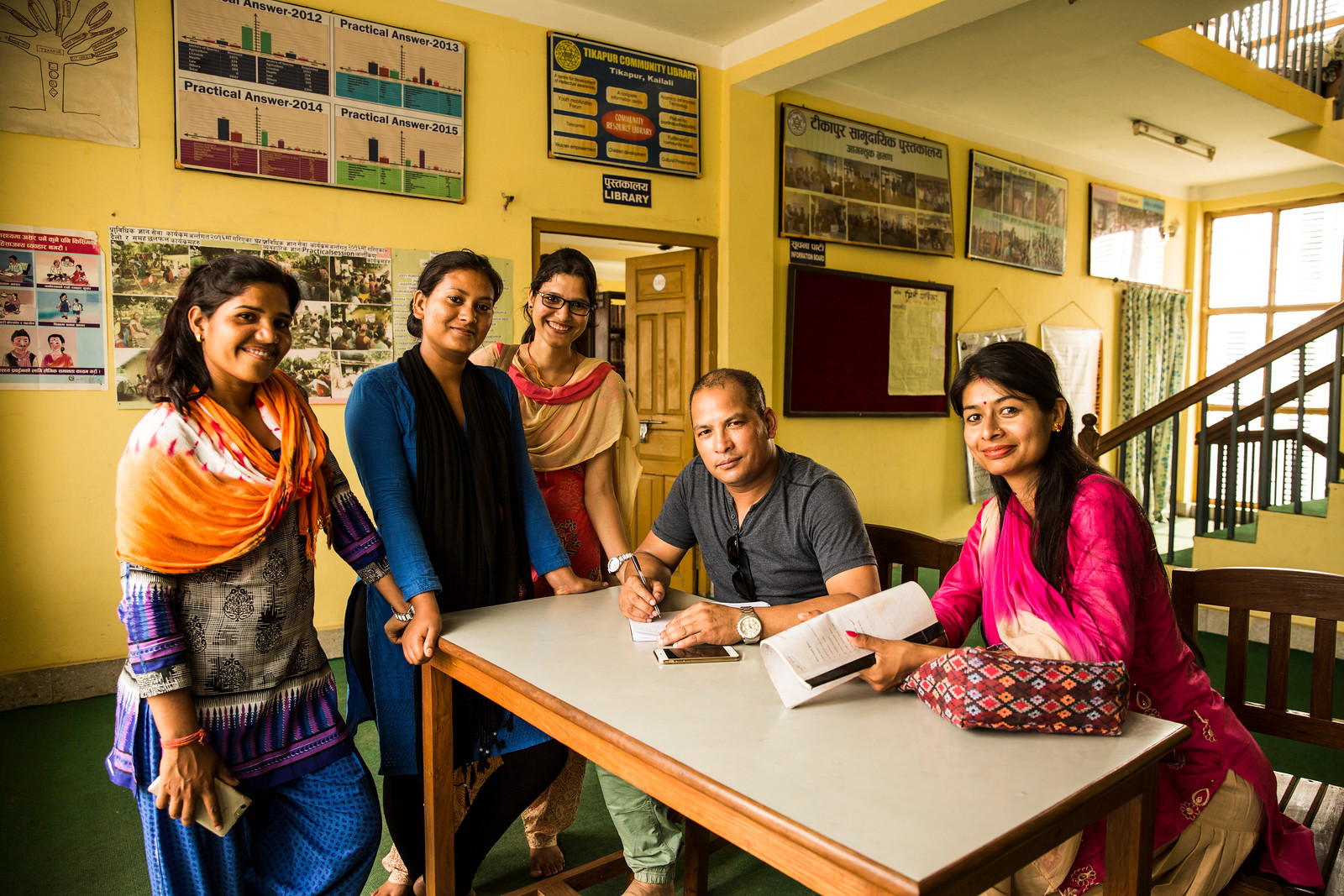We will continue to update this page as we have new information to share from our board, our READ Global team, and our country teams. Thank you so much for your interest & support!
And if you’d like, you can help us continue our efforts by donating.
Regional and Country Office Updates – November 2021
COVID has begun to stabilize in South Asia, letting READ Centers start to pivot from emergency response back to relief, recovery, and progress. READ Centers in Nepal and India continued their relief efforts throughout the summer and fall.
In Nepal, READ Centers provided relief to over 2,598 households reaching approximately 14,400 people. Some Centers also distributed fertilizers to marginalized farmers within their community to help them secure their crops during the monsoon planting season. As the supply of vaccines is increasing, some READ Centers are also serving as local vaccination sites so community members do not need to travel for hours to reach district health centers.
To date, READ India has distributed 1,700 ration kits in 22 locations, as well as more than 32,000 masks produced by the sewing enterprises at READ Centers. In addition, READ India has continued a heavy schedule of remote learning opportunities with more than 20,000 log-ins to READ-hosted learning sessions. READ India is currently launching two new innovative social enterprise initiatives, one to train a cadre of community health workers to meet the demand for more trained local health assistants, and one to launch sanitary pad social enterprises at four READ Centers supported by Amazon India.
In Bhutan, READ is partnered with teachers and librarians to provide engaging weekly literacy catch-up sessions for 1,340 students, and supporting children with reading, math, and other lessons, as well as general support to help them complete homework.
Get the full update on all our teams’ work.
To date, READ Centers have:
Distributed 216,341 masks,
Distributed 11,890 food rations,
Reached 38,700 with COVID-related information
Provided 709 people with routine vaccinations and prenatal check-ups
Reached 10,590 students with school support
Regional and Country Office Updates – June 2021
As India and Nepal continue to grapple with rising COVID-19 cases, the increasing demand for treatment is pushing the region’s already exhausted healthcare system to a breaking point. Even for those communities that have contained the spread in Bhutan and elsewhere, the pandemic has caused prolonged disruption in schools, work, and community-building activities. Adults who lost their livelihoods are struggling to put food on the table. Children, most of whom do not have computer and internet access, are falling behind as online learning is impossible for them. Without immediate relief and sustainable recovery efforts now, it may take years to overcome the long-term consequences of the pandemic.
Regional and Country Office Updates – March 2021
READ Centers quickly adapted to meet the new challenges posed by COVID-19, becoming lifelines for communities even when their physical premises couldn’t open. Now, local READ Centers are pivoting their efforts from response to recovery as vulnerable families identify the specific support they need to overcome long-term challenges exacerbated by the pandemic. READ Centers make it possible for communities to have small, socially distanced meetings and develop plans with local government to set plans and ensure community members have
continued access to food, education, and economic opportunities. Through your support, you can help READ communities in their rebuilding efforts toward inclusive, sustainable, and resilient futures.
Regional and Country Office Updates – June 18 2020
South Asia still faces an uphill battle to overcome the virus and the economic impacts of prolonged shutdowns. In the two months since our last dedicated update, READ Centers have done so much to support their communities during these very challenging times. While most READ Centers have closed their physical spaces temporarily to help slow the spread of COVID-19, they are relying on longstanding partnerships, networks, and trusted relationships to continue to serve their communities, though how they reach community members is shifting. As the situation evolves in each country, Centers’ flexibility to devise the right solutions continues to grow in meaningful ways.
READ Bhutan
Bhutan continues observing a partial lockdown with 33 confirmed cases and no deaths. Since March, READ Bhutan’s innovative efforts include:
- Increasing social media & radio outreach to share information about hand washing and hygiene.
- Growing their mobile libraries program to provide much-needed educational opportunities for children currently out-of-school in rural areas.
- Adapting in-person women’s literacy classes to offer them online and continue empowering women with skills to succeed.
- Increasing broadcasts from the Khotapka READ Center community radio station, which reaches nine rural villages, to offer more educational content for children and add content produced by the Ministry of Education and governmental public service announcements.
READ India
With a global recession looming, India’s government is cautiously reopening its economy while continuing to promote work-from-home for most. Smartphone penetration is relatively higher even among vulnerable groups in India, which enabled READ India to begin offering their regular trainings to adults and children remotely within mere weeks of the pandemic and national shelter-in-place order.
READ India Centers hope to re-open for programming in small groups this summer. They also plan to continue to offer remote learning, and want to serve people who live further from Centers or cannot easily visit them. During this shutdown, READ India mobilized support of communities through a combination of information-sharing, immediate relief response, and adapting services to support efforts to combat COVID-19.
Additional work and innovations include:
- Shifting production to making masks, PPE material, soap, and hand-washing kits – as of May, women in the READ India network had made and delivered over 100,000 masks.
- Distributing food rations: wheat, rice, oil, and pulses.
- Broadcasting radio and audio programs to share current, government-certified information.
- Addressing mental health issues and trauma resulting from the pandemic.
READ Nepal
READ Nepal used this data and regular stakeholder consultation to shape its response. Their work has included:
- Conducting information campaigns to build media literacy so community members can distinguish between rumors and valid information about COVID-19 from qualified organizations.
- Distributing food and essential resources (masks, emergency kits, and paracetamol) to those who most need it.
- Coordinating with Kathmandu vendors to provide PPE, masks, sanitizers and gloves to local organizations.
- Mobilizing a relief fund for day laborers to provide them with food and supplies, especially important because interruption in their income affects very poor and marginalized communities.
- Adapting programs like prenatal education to an online platform so expecting mothers can continue accessing vital information.
- Coordinating immunization for children and check-ups for pregnant women in a trusted space.
Country Office Updates, April 6, 2020 (Scroll Down for READ Global Org-wide Update)
Country offices quickly shifted support to READ Centers through continued efforts to meet community needs, even though all READ Centers have been closed temporarily to facilitate social distancing and protect public safety. And they are absolutely innovating, both at the local and national level.
Bhutan
In Bhutan, the response has emphasized continuing essential community services in the way that best supports public health. Centers are opening two days a week for three hours, for book lending ONLY, and all programming has been cancelled. In addition to hand-washing stations at READ Centers, they are taking book requests via phone and online so family members of those who are unwell can pick up books for them.
READ Bhutan and Centers have put together free, online educational resources, shared them with families, and made them available via social media to help parents and children continue their learning at home.
In Changjiji, the READ Center is using a mobile library program, offering books and supporting activities targeted at young readers, held once a weeek. The Chuzagang READ Center’s meeting hall has been made available to the local government to use as a quarantine facility.
India
With growing concerns across India about the frantic migration outside of urban centers into more rural parts of the country and the nation on lockdown, the READ India team has worked rapidly to pivot services and programs. With the support and partnership of corporate partners, READ India has been able to shift specialized services focused on responding to the nation’s current crisis.
This flexible funding allows READ India to better respond to the immediate needs of communities now. Already, READ Centers in India are recruiting community member to stitch masks and share government approved advocacy material. Centers have also made their facilities available at the government’s request to be repurposed for quarantine if necessary. As they continue to develop online content to support their communities virtually, they’ll also continue to track the impact of the crisis within each community READ Center’s serves. Stay tuned for more updates as the situation in India evolves!
Nepal
In Nepal, various centers have begun offering: support and consultation to community members and library users to encourage them to discern valid information and follow suggestions of qualified organizations, distribution of mask and paracetamol to library users, education on proper hand washing and in some cases, ambulance service for those in need.
Furthermore, understanding the tremendous economic toll on day laborers, the Presidents of 36 READ Centers in Nepal went a step further by jointly launching a relief fund to help provide daily essentials for day laborers.
READ COVID-19 Response & Latest Updates, March 23, 2020
Our goal is to prioritize the health and safety of our employees and the communities we serve, and to ensure that the most vulnerable populations – the elderly, children and women – continue receiving vital and accurate information in the coming days.
READ’s vision – to create safe places for access to education and information with an eye toward empowering rural communities to drive their own prosperity – is more important than it has ever been. READ Centers will continue to serve as hubs of vital information for at-risk communities, whether it is accomplished in person or remotely through community radio programs and/or pamphlet distribution. Already, we’ve seen youth leaders at READ Centers disseminating valuable health information produced by their Ministry of Health promoting healthy behaviors to prevent the spread of the virus in rural communities.
- As of March 23, READ Centers are temporarily closed to the general public due to restrictions (Nepal, India and Bhutan are all now in under a mandatory order to stay at home), all READ Centers are temporarily closed and READ staff is working from home to minimize the spread in their communities.
- All three READ country offices have temporarily halted trainings involving large groups of people. Minimizing spread of the virus and ensuring communities continue to have access to trustworthy and accurate information about the changing situation concerning the virus will be READ’s priority over the coming days and weeks.
- Despite being closed to the public, the Centers are conducting activities to keep community members updated with accurate information on prevention, safety, and government requirements. They are sharing information with communities in a variety of ways, including signage on the centers, distributing pamphlets, and digitally via Center Facebook pages, as well as in-person and phone outreach. Centers are offering their spaces for the purpose of quarantining, if needed.
- Most READ Centers are reducing their operating hours, but people can continue to have access to books and newspapers while their movement is limited.
- Among other precautions, READ Centers have been asked to thoroughly disinfect all surfaces.
How can you help? During these hard times, we need your support more than ever. READ Centers have always served as trusted sources of information and life-changing programs and resources for rural villagers. As we saw in Nepal after the 2015 earthquakes, community members will be turning to their READ Centers as trusted sources of information, as well as for services for those most impacted by the pandemic.
We will continue to share updates in the coming days and weeks, as the situation is evolving rapidly.






